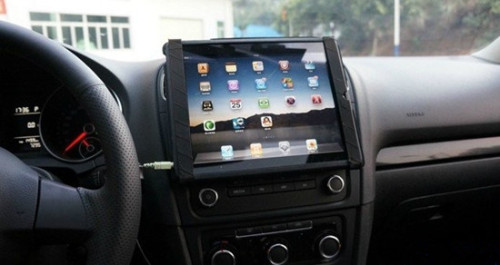
At the recent Geneva Motor Show, Apple officially released the much-anticipated CarPlay on-board intelligence system, including Mercedes-Benz, Ferrari, BMW, Ford, GM, Honda, Hyundai, Jaguar. Companies such as Land Rover, Kia, Mitsubishi, Nissan, Peugeot Citroen, Subaru, Suzuki, and Toyota also have established partnerships with Apple, so we expect to see this system appear in new models that will come out soon.
When we saw this, we couldn't help but ask: What's so special about Apple's CarPlay?
On the face of it, this product is only aimed at car manufacturers to introduce a deeply customized on-board operator interface. This is very similar to the “Ford Sync†car entertainment system launched by Microsoft and Ford at the 2007 CES show. The system also allows drivers to make phone calls and hear text messages via voice commands. Drivers can also use voice commands or buttons on the steering wheel to play portable devices such as iPods, Zunes, and even read music files from USB flash memory.
So, why is Apple's CarPlay different from the former and why does it take only 7 years to come?
Perhaps this is partly because automakers need a certain amount of time to realize that their previous traditional approach to car infotainment systems is doomed to failure. At the beginning of the rise of this industry, the so-called "car infotainment system" only contained radio stations and a CD player. Therefore, what automakers need to do is only add an entertainment system to their own production lines. Console procedures only. However, as software began to invade the car console, car manufacturers suddenly felt powerless. Moreover, the practicality of the navigation and entertainment systems that they provide for cars is still far from compared to smart phone and tablet applications.
The alliance between Ford and Microsoft enabled the latter to design an in-vehicle information system for the first time, but Microsoft has never found the right direction for R&D. At that time, the "Ford Sync" system developed by Microsoft was actually a car Windows system based on the car console, but what consumers really needed was to connect the on-board system to the smartphone.
In fact, after having a smart phone, tablet interface, power supply, and an accessible interface to the audio system, car users actually have a familiar vehicle-mounted Internet environment. In this environment, we can perform operations such as storing music, playing streaming media, listening to radio stations, navigating, setting reminders, viewing phone books, and updating social media. Car consumers do not need another device to do these jobs, but they want to be able to continue to use the equipment that we use every day in our daily life.
Undoubtedly, Apple realized this demand from consumers very early on, but persuading car manufacturers to accept this reality requires more energy. With the introduction of CarPlay, Apple has provided drivers with an exceptionally simple and secure internet access function over the internet.
Smoke diffuses
At the same time, Google is advancing in the same direction with its "Open Auto Alliance" platform announced at the 2014 CES show. At present, Google does not give much information on this platform, but we believe that the company's plan will not be as simple as simply copying the Android system into the interior of the car.
With Apple and Google joining the war situation, the automotive industry will also usher in earth-shaking changes. Previously, consumers who often need to share a car with many people and often rent cars can even bring personalized car entertainment and information systems seamlessly to any vehicle.
Some analysts believe that the "smart car war" around the dispute between Apple and Google, the two giants of technology, has begun. At present, the consumer demand for in-vehicle entertainment information systems is actually very simple. All they need is a safer driving interface (whether it is their own vehicle or rented vehicle) through an interface similar to their own smartphones and tablets. Control navigation, music, and information systems.
Moreover, as smart phones have become an integral part of modern human life, auto makers also need to avoid rigid rules. For example, iOS consumers can only choose BMW, or only Andorid users can drive Audi models. Because different members of the family may have different device models, and they will also buy new devices from time to time. However, it is obvious that they will never change cars because they have purchased a new mobile phone.
Although the war on smart car operating systems is likely to revolve around the relationship between Apple and Google, car manufacturers will not come to an end, because they all want their vehicles to be able to connect with as many devices as possible. . So far, companies including Honda, GM and Hyundai have all become members of Apple and Google's automotive system, and we do not think that these companies will give up their attempts to force their "selected camp." On the other hand, although it is not difficult to establish a uniform interface standard for all devices, this concept may not be realized in the short term.
Future vision
Judging from the current situation, Apple and Google's goal is not just to occupy the car consumer information and entertainment system so simple, they hope to help drivers establish a more advanced automatic car real-time management system. In other words, Apple and Google hope to establish an Internet of Things around the car and ultimately make the vehicle safer, more fuel efficient, and make the driver feel more relaxed. To do this, the two companies first need to establish a mechanism that can interact with other vehicles and external traffic management systems, allow vehicles to detect the presence of other vehicles, and avoid accidents as much as possible.
If the above vision can eventually become a reality with the efforts of Apple and Google, future drivers may be able to watch movies, browse Facebook updates, and even close their eyes while driving.